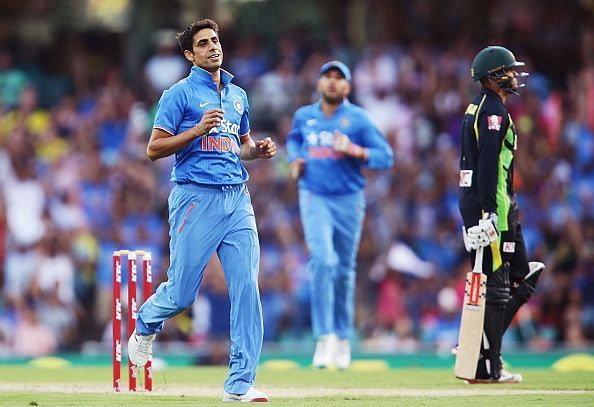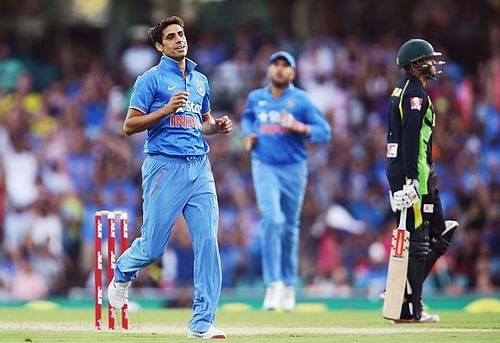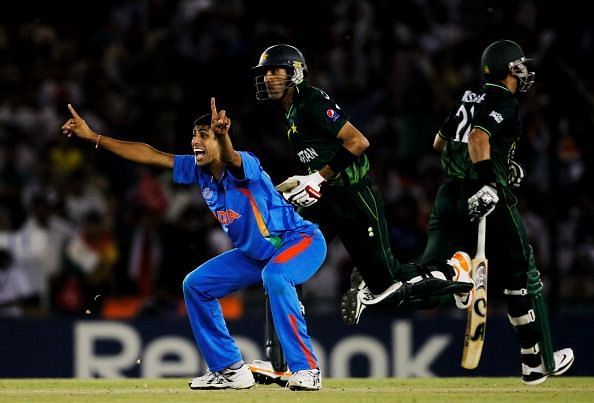
The Ashish Nehra School of Pain

Do you ever look at your past and laugh at yourself? Do you, for some sense of belonging to the mortal world and to escape self-loathing, deride what happened to you and brush it off with careless insignificance? If you do, it means that the past wasn't worth your time. The dreams you let go of and the pain you felt weren't really there. They weren't dreams, and it wasn't pain. If it really was worth your time and effort, you would never laugh at it. Do you think making art out of your pain helps? I think it never helps. You see, pain is a traitor. Making art out of it is like giving birth to children, who haunt you whenever you visit them.
"At times when I wake up, especially in the winter in Delhi, my knees are so sore, it is half an hour before I can even leave my bed and am able to walk. I have had four surgeries in my ankle, plus my knee is always sore. But again, after half an hour so I say it to myself that I have to do it."
Ashish Nehra's words show you how stubborn he is. To. Not. Let. Go. He doesn't want to let go of the only thing he's learned to master. It's also the only thing, perhaps, that has pained him the most. If I were to sum up his career - that lasted for 18 years and only 17 Tests - it would be the word-by-word translation of this quote: "Find what you love and let it kill you."
"I am the kind of person that if I decide [I'll do] something, I have to do it. There's no rocket science to this. You have to give 3-4 hours of the day to your body, definitely you will get the result. Some may get it later, but in the end, you will."
Look how stubborn he is. He loves racing against time, his own body, and the forces of nature. He believes that if you put in the effort for something, sooner or later you will get the results. It may not have mattered to him that those results were limited to two world tournaments, one of which was played in a format he wouldn't have grown up playing.
Nehra was so anonymous that nobody knew he was still playing for India until he was picked in the team. But once picked, age notwithstanding, he didn't like sitting out. A 38-year-old fast bowler picks himself ahead of two of the best T20 exponents in world cricket at the moment - sounds ambitious? A touch arrogant, maybe? It is glad in a way, then, that he was dropped only twice in his ODI career, and recalled only once.
"The day I linked up with this squad (for the Australia T20I series), I spoke to the captain and coach about my plan, because whenever Ashish Nehra is in the side he plays in the XI; he doesn’t sit out, we’ve seen that in the T20s over the last couple of years."
Perhaps it was clear to him now that his body wasn't the only thing unhappy with him playing cricket. Perhaps the captain Virat Kohli, ten years younger than him, who would have grown up remembering that Nehra too played for Delhi, especially when he was felicitated by the veteran, felt the same.
"The only one thing that is not happy that I am still playing is my body. Body mein injury nahin hai, injury mein body phasi hui hai. (I don't have injuries in my body, my body is somewhere in the middle of those injuries)"

So here's a man who knows his body has given up on him. He knows that he's a little too old for fast bowling and knew, perhaps, that each recall came with the prospects of a pink slip. It was as if it weren't just his body or Kohli who thought otherwise but several others shared the perception as well. And yet, he kept punching above the weight. He kept masquerading a 1990's model of Maruti - his body - as a Ferrari with dents painted out.
It was like the second-hand vehicles that were a trend in Indian middle-class families until recently. It was like you know things are getting out of your hand, that you can no longer afford what you seek, that the captain needs to hide you in the field, but you don't want to give up. You use leagues, you use your reputation and you use patriarchy - Nehra was a senior, experienced bowler - to force yourself back into the mix.
"When you are young you don't understand these things, you don't understand the value of playing for India. In the last 7-8 years I missed so much cricket, maybe you can say I am trying to catch that up. You can never go back, but for the last 4-5 years I am pushing myself and I am getting the results. My body has let me down, that's why I am so upset with my body at times."
Nehra, at best, was a kid who grew up too late. He didn't understand the value of things - including his own body - and by the time he did, he had been leapfrogged by the T20 generation. He had a lot of catching up to do too late in his career. Nehra's tipping point didn't come early. It didn't come late either. It just didn't come, and he had to make peace with it.
Nehra was a true middle-class millennial - anonymous, obscure and yet alive, meandering on with indifference towards the world, a favour returned in equal measure. He was India's strike bowler in an era when strike bowlers were absent. There were only spinners. At least now he would rest in peace thinking that's no longer the case.
"I have given it (retirement) a good thought, especially with the way Bhuvi (Bhuvneshwar Kumar) and (Jasprit) Bumrah have been bowling over the past six months. I feel Bhuvneshwar is ready, the way he has been bowling, and there is no big event in the next five or six months, like a World Cup or anything. It’s very important to me what people in the dressing room think.
"Now they say you can easily play for one more year. I’ve been a believer of the fact that it’s always good to retire when people ask why and not why not."
There's a third bit that he perhaps forgot to add to 'why' and 'why not' - does it matter? That's how Nehra was - he didn't matter. He was that piece of the puzzle which would not bother the explorer even if it is lost. The story would be complete. The team would be complete. He wouldn't matter, notwithstanding the pain he imposed on himself. There was, on most occasions, zero returns on investment, and that was because maybe he had chosen the wrong path.
He had chosen to make art out of his pain - to give birth to children. You would wonder at the end of his career whether each of those games he played in the last two years contributed more to his peril than to his good. But that was it, that was his silver lining.
Nehra lived life in its truest sense - from inception to destruction, picking up injuries and surgeries on the way. He destroyed himself in the quest of what he loved and just when it seemed like he was ready for another bout, for another push above the weight - with no relevance or future whatsoever, just for the sake of being alive - he died.